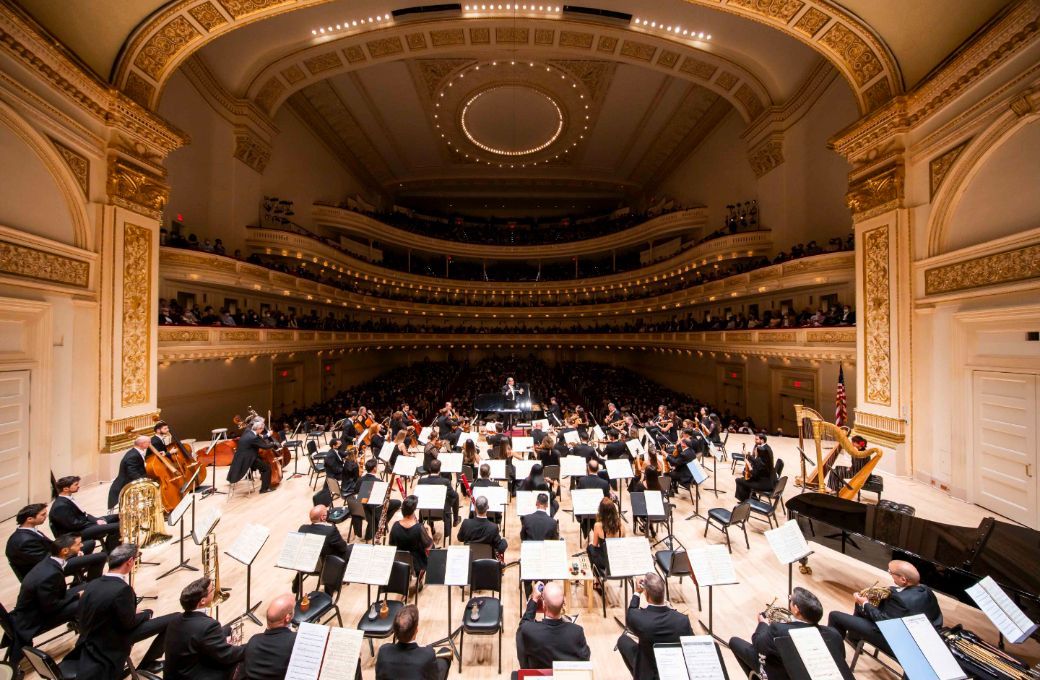Exactly a fortnight before the official opening of the new season at Carnegie Hall, the Stern Auditorium hosted the first ever gala of the Teatro Real (Royal Opera of Madrid) in New York City. For the occasion, the Orquesta Titular del Teatro Real – also known as Orquesta Sinfónica de Madrid – conducted by Juanjo Mena performed a programme entirely dedicated to Spanish music, mixing the well-known with the rarely performed (at least in North America).
The two soloists were Spanish as well. Javier Perianes tackled with gusto the technical difficulties of Manuel de Falla’s Nights in the Garden of Spain, premiered at the Teatro Real in 1916. He was in full accord with Mena and the ensemble in terms of pace and dynamics; multiple dialogues with members of the woodwind section were elegant and well-balanced. Nevertheless, neither the pianist nor the instrumentalists accompanying him were able to fully capture the suave and mysterious, Debussy-evoking perfume, especially prevalent in En el Generalife, the first of the piece’s three stitched-together nocturnes.
After the interval, it was the turn of soprano Sabina Puértolas. She added to the three initially selected arias from different early 20th-century zarzuelas – La Cancion del Ruiseñor (Song of the Nightingale) from Doña Francisquita by Vives, “En un pais de fabula from La Tabernera del Puerto by Sorozábal and “Me llaman la primorosa” from El barbero de Sevilla by Nieto and Giménez – an encore in a similar mould: “Carceleras” from Ruperto Chapi’s earlier Las hijas del Zebedeo. These songs and the name of their composers might be unfamiliar to Carnegie Hall’s regular public, but the delighted, knowledgeable and somehow unruly crowd attending the Teatro Real’s performance was very appreciative. Puértolas’ rendition was a tad uneven. Her diction was always clear and her ability to engage listeners with her storytelling remarkable. Nonetheless, it took some time for her instrument to warm up while sounding tired towards the end, even if she succeeded finishing her mini recital with a flourish. The coloratura sequences were mostly handled with delicacy. At the same time, there were several moments when her voice was not able to penetrate through a thick orchestral sound wall.
Among the purely orchestral works conducted by Mena, the Prelude from El bateo (The Baptism) by Federico Chueca was nothing more than an insignificant cesura placed amid Puértolas' songs, while the encore – the Interlude from The Wedding of Luis Alonso, by Giménez (another zarzuela) – easily fulfilled the role of crowd-pleaser. Three fragments from the first two books of Albéniz’ Iberia Suite (El Puerto, Evocación and Triana) were colourful enough, but, quite heavily orchestrated, lacking the subtlety and the lightness of the original piano music.
The interpretation of de Falla’s two suites from The Three-cornered Hat, bookending the performance, and of his Interlude and Spanish Dance from La vida breve, introducing the second part, gave the true measure of this orchestra’s potential. Mena conducted the individual numbers with precision, allowing instrumentalists to shine (such as the horn or oboe in the Danza del molinero). More subdued earlier, the interplay between strings and woodwinds bloomed in Las uvas, while the culminating Danza final was full of fire.

Overall, this concert was a pleasant experience, but by no means an exceptional one. An evening of Spanish music, rendered by a Spanish orchestra and soloists, did indeed reflect the interpreters’ special affinity for the rhythms and sounds of their homeland, but little was explored beneath the shiny veneered surface.


